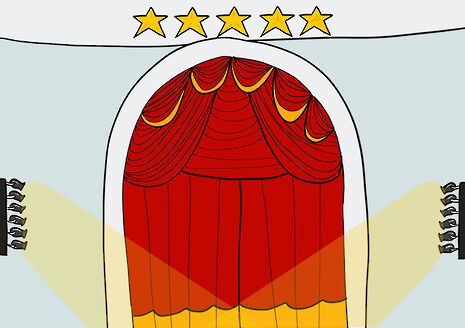The role of the reviewer in Cambridge theatre
Is the reviewer still relevant in the modern age of theatre, reflects Sarah Robertson

The theatre is saturated with the excited chatter of spectators, blissfully dislocated within the anticipation of entertainment. Discreetly, I find my open seat, demarcated by a sheet of printer paper: “reserved for reviewer”. The performance commences, and I engage, yet simultaneously engrossed in my flurry of scribblings into an open notebook, as to not forget ephemeral details: visuals, apt descriptors, or memorable lines, those well-executed, and those, well, not so much. At the concluding applause, the rooms is imbued with a shared warmth, performers and audience members having, in a sense, created something in tandem. I tuck my notebook under my arm and start away as the claps patter off, always one of the first to venture back into the evening.
Such is the job of the theatre critic: a phrase that when uttered might strike fear (or probably, rather, annoyance) into the hearts of creatives everywhere. In the space of performance, it’s a dislocated role, not an element of the creation of the art, nor the generic spectator, there strictly to be entertained. Yet, despite the isolated nature of the role, the critic still remains integral to the theatrical experience. The role of the theatre critic is multifaceted, and overall, characterised by the love of the art form, attempting to inspire audiences to see outstanding works, and perhaps, conversely, steer watchers away from the lacklustre.
"No matter what a critic might say, it always will remain in the hands of a reader whether to act on it or not"
The role of the reviewer does, of course, differ between the student and professional spheres. Upon writing a review, at any level, it is important to acknowledge the scale and resources that might affect the product of performance. The reviewer shouldn’t be a menacing figure – being inordinately critical without being constructive is useless for all parties involved. Approaching student theatre with a such a lens is crucial. Though a professional reviewer might blast a commercial production, for, in essence, its misuse of bounds of monetary resources and experienced talent, a student production, even as a finished product, is an amalgamation of works in progress, and should be held to such a standard. Yet being overly forgiving and thus untruthful isn’t fair, either. The student review should then exist in the space between the lenient and the biting, in order to fulfil its fundamental task of assisting in the improvement of the theatre it speaks on, working as a sort of collaborator to the creative process.
In the student context, a reviewer is just as much in training as the theatre practitioner. As performers and creatives are improving their craft with each production, similarly, critics work to improve their writing and artistic eye. It is unrealistic to expect finesse from either side, as both are in the midst of constant development.
However, the critic should be expected to uphold the same commitment to a high standard of creative ability as those involved in the production itself. In the Cambridge setting, with a plethora of performances put on each week, a review might make the difference of whether one decides to see a show at all. It’s important, then, for reviews to be crafted with care. The critic’s judgemental eye should be a coalescence of both journalistic skill of presentation as well as a level of experiential and academic knowledge regarding the artistic form critiqued. This might be unrealistic, initially, but these aspects are gained over time, both through training and also in duty and respect to the production.
A central feature of the review process in the context of Cambridge theatre is star ratings, which are used regularly as a prelude to the review itself. Of course, there are pros and cons: unstarred reviews can come across as indecisive, bouncing too freely between the positive and the negative. With stars, there’s an element of imprecision, being blunt in deciding the quality of a production. However, contrarily, using stars promotes the need to be extremely opinionated – audiences want to read a damning one-star review, or a glowing five-star one, less interested in the tepid neutrality of a three-star designation. Stars, as a concept, promote the generalisation of shows into broad categories, when of course not all four-star shows were designated as such for the same reasons. And of course, the use of stars could negate the need for reviews altogether, with readers only using stars to base their judgement.
This brings into question whether reviews are necessary at all, when five filled-in bubbles might yield similar results. Can it be said that theatre and the review might exist as a sort of chicken-and-egg scenario, where one cannot exist without the other? Of course, theatre can certainly exist without the review, and oppositely, the review inherently depends on a subject for its creation. But a review, I argue, strengthens theatre through the creation of a level of expectation – to continue to create not only commercially successful theatre (read: the plethora of film-turned-stage musicals like Frozen and Pretty Woman on Broadway), but to push creatives, students and professionals alike to make not just enjoyable but stimulating, thoughtful, and objectively good pieces of art for audiences to find and digest. With the review holding the creatives accountable, audiences are given an advocate, a voice to push theatre in invigorating and challenging directions.
And of course, an audience shouldn’t be told what to feel – a review is just one person’s opinion. No matter what a critic might say, it always will remain in the hands of a reader whether to act on it or not.
So what, then, is next for reviewership? Although many papers have been financially pressured to streamline and cut non-essential writing (which, sadly, is often associated with the ‘arts’ section), I would argue that artistic critique remains essential, and theatre reviews should remain just as present as before. Without being self-congratulatory, criticism is integral, for the continued promotion of theatre, and betterment of the practice altogether. Yet, on a personal level, it’s been equally fundamental, allowing me to submerse myself in an adjunct part of performance, able to creatively and artfully express a critical perspective regarding it. Maybe, then, criticism is a bit of the both-- immersing oneself in the grandeur of performance and creative accomplishment, yet also slinking off into the evening post-show, often, all the while, humming (recently, relentlessly catchy melodies of Spring Awakening, or Into the Woods) under my breath, still lost in theatrics, eager to smooth my tangle of thoughts upon the page.
 News / Cambridge academics stand out in King’s 2026 Honours List2 January 2026
News / Cambridge academics stand out in King’s 2026 Honours List2 January 2026 Interviews / You don’t need to peak at Cambridge, says Robin Harding31 December 2025
Interviews / You don’t need to peak at Cambridge, says Robin Harding31 December 2025 Comment / What happened to men at Cambridge?31 December 2025
Comment / What happened to men at Cambridge?31 December 2025 Features / “It’s a momentary expression of rage”: reforming democracy from Cambridge4 January 2026
Features / “It’s a momentary expression of rage”: reforming democracy from Cambridge4 January 2026 News / Varsity’s biggest stories of 202531 December 2025
News / Varsity’s biggest stories of 202531 December 2025










